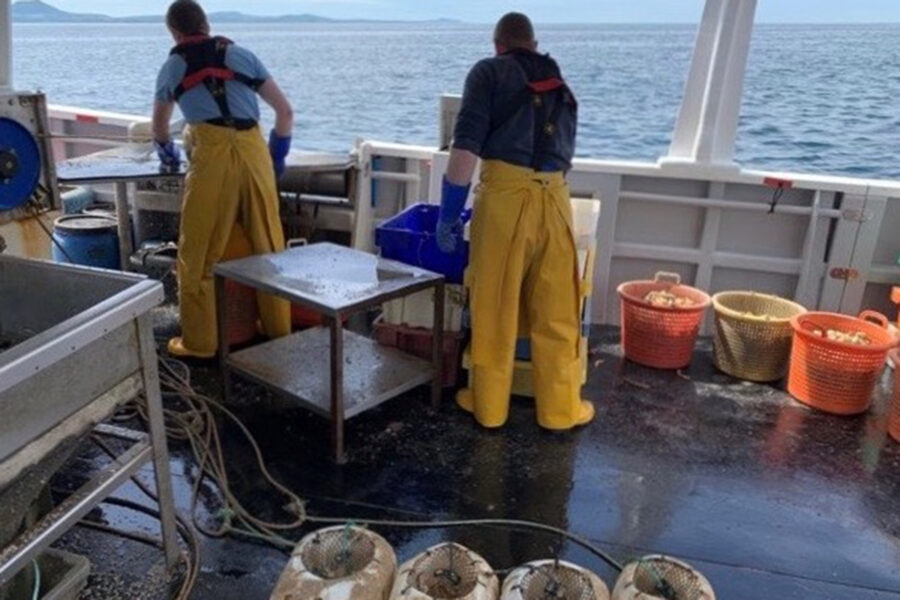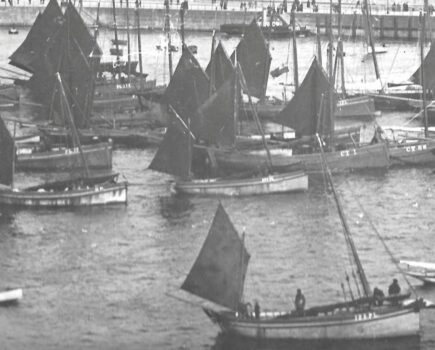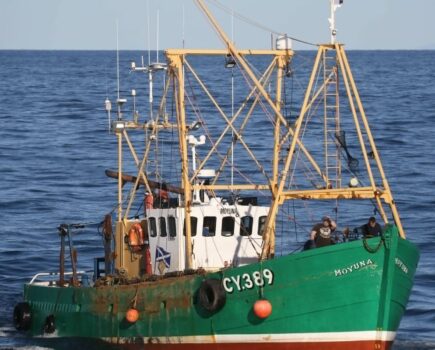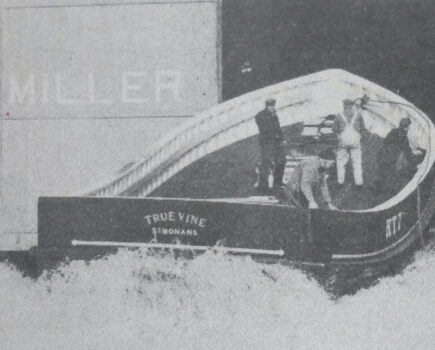An insight into the research revolutionising how we approach whelk fisheries – part of one of the collaborative shellfish Fisheries Industry Science Partnerships
By Jack Walker and Fiona Birch
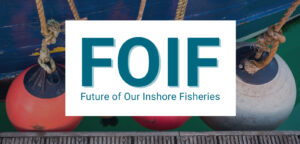
Once a popular street food in the bustling alleyways of Victorian London, the whelk has taken a step back in recent years in terms of domestic consumption. Yet whilst this diminutive shellfish may not be the go-to choice for diners in Britain today, for the people of France, Spain and as far afield as South Korea, whelks are all the rage.
With UK landings worth £27.3m in 2020, whelks remain an economically important staple of the UK seafood landscape.
Yet despite this financial significance, whelks have remained data-deficient, without any form of stock assessment in place to inform effective management of the fishery. This is where the Fisheries Industry Science Partnerships (FISP) scheme stepped in, with Seafish leading the shellfish research project, co-developed by the industry-led Whelk Management Group and undertaken in partnership with researchers and members of the fishing industry. Collaborators include
Heriot-Watt University, Bangor University, Leach Fishing Enterprises, Brighton & Newhaven Fish Sales Ltd, Macduff Shellfish (Scotland) Ltd, Orkney Fisheries Association, Lynn Shellfish Ltd and the Western Fish Producers’ Organisation. Together, these contributors are helping to address some of the key knowledge gaps around whelk fisheries in the UK.
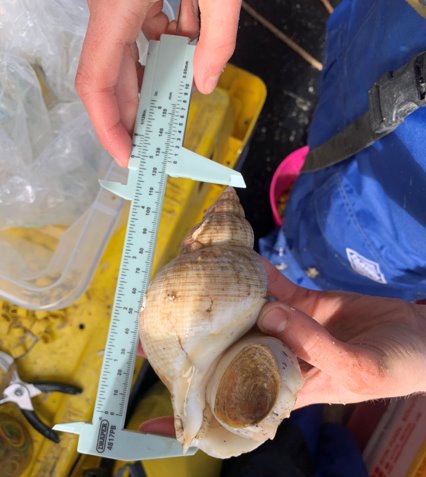
Soak times over 45 hours have been found to improve the effectiveness of escape gaps, reducing the proportion of undersized whelks to as little as 1%.
Speaking with Moritz Eichert, a research assistant at Heriot- Watt University, he detailed three of the FISP work packages, focusing on pot selectivity, whelk handling and alternative baits. He said: “These projects are a ‘colourful mixture’ of industry collaboration, including fishermen, science, regulators, Seafish and the IFCAs. This network of connections provides a range of expertise, providing a great level of insight into the issues that face whelk fisheries in the UK.” In the world of whelks, all hands are on deck to support these ambitious projects.
Working with local fishermen off the south coast, the team at Heriot-Watt investigated the current system for potting whelks – and whether the need for riddling can be avoided altogether through the optimisation of selectivity measures and escape gaps. Understanding how whelks of different sizes interact with pots sheds light on which sustainability measures could be appropriate for conserving whelk stocks, as it allows fishermen to better target appropriately sized whelks.
In this particular part of the research, it was found that whelk pot selectivity is highly dependent on the soaking time of pots – the longer whelks spend in the pot, the more effective escape gaps are. Soak times of over 45 hours saw a discard rate as low as 1%, with shorter soak times (18 hours) always necessitating riddling in order to address the smaller whelks that linger in pots.
When it comes to allowing whelks to utilise escape gaps, time seems to be key. The management implications of this research are yet to be determined, and any conservation measures must be considerate of realistic fishing practices.
Whelk riddling has long been a subject of interest to both fishermen and researchers, with the effects of the process on the whelks still poorly understood. In a combination of lab- and field-based research, the time spent aboard vessels and the handling they endure during the riddling process will also be investigated.
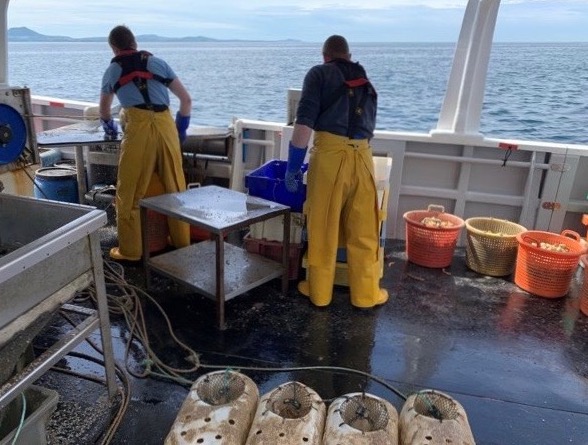
Working with whelk fishermen off the south coast, researchers from Heriot-Watt University have been investigating how escape gaps in pots could be optimised to improve selectivity.
It was found that the utilisation of cushioning or rubberised impact surfaces can significantly reduce the
time whelks require to upright themselves, potentially increasing their chances of survival. For fishermen, treating undersize whelks with a gentle hand, alongside a swift return to the sea, may be the key to their survival in the face of disorientation and susceptibility to shellfish-hungry sealife.
Whelk races may not seem like a productive use of academic time but this bold experiment is helping to inform whether alternative, sustainable chemical attractants may entice whelks. Dogfish and brown crab, the traditional baits used in whelk potting, are being set aside in favour of fish trimmings and Nephrops waste, with the hope that discarded leftovers can be utilised to support the sustainability of the fishery.
At Bangor University, Dr Natalie Hold and Dr Charlotte Colvin are broadening the scope of shellfish research by tackling the question of how climate change will affect whelk fisheries across the UK. Collaborating with fishermen and the British Geological Society, the effect of rising sea temperatures on whelk growth rates is being investigated to better understand what the future has in store for them.
Given a suggested link between recent whelk mortality events in South East England and the warm summer of 2022, understanding how whelks are affected by marine heatwaves has never been more relevant. This means that discerning the survivability of whelks – a boreal and cool-water-loving species that already exists at the southern limit of its range in UK waters – under warming marine conditions could prove to be a vital thread of the research.
With fieldwork spanning from Jersey to Shetland, the research team formed invaluable links with whelk fishermen across these areas through the ingenious exchange of training for samples. From advice on stock assessments to dissection tips to details on effectively measuring whelk populations, a wide array of training was imparted to fishermen, who lent a helping hand with research.
“One thing whelk fisheries have traditionally lacked is good data collection, which is why it’s so important to have a scientific approach for obtaining data from fishermen and research projects alike, to bridge the data gap around whelks,” said Dr Natalie Hold, stressing the importance of co- operation between researchers and whelk fishermen to feed into effective stock monitoring and management. The collaborative nature of projects such as this one not only reveal the complex nature of our whelk fisheries, but solidify the cross-sector connections that will ensure a sustainable future for them.
This humble sea snail supports the livelihoods of countless hard-working fishermen across the UK. For their way of life to continue, more targeted sustainable management is needed to support whelk fisheries. With the rigorous work underway in these FISP projects by scientists and fishermen, the new light being shed on whelks is the first step to making this a reality.
This story was taken from the latest issue of Fishing News. For more up-to-date and in-depth reports on the UK and Irish commercial fishing sector, subscribe to Fishing News here or buy the latest single issue for just £3.30 here.
Sign up to Fishing News’ FREE e-newsletter here.

